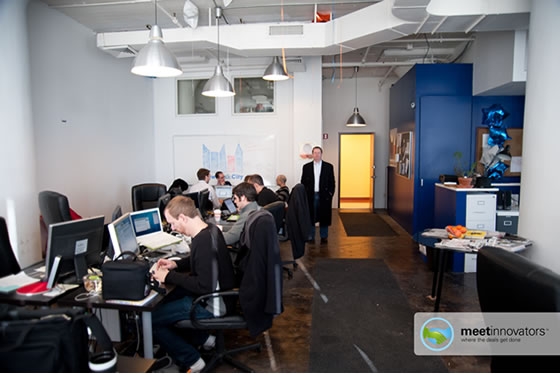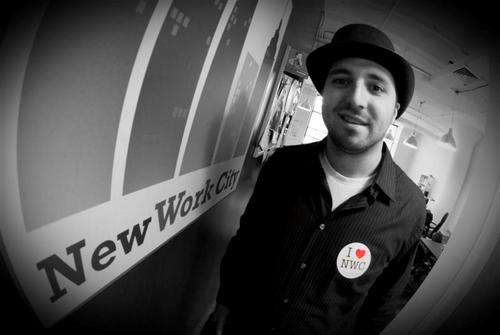
- How Guys Like Tony Bacigalupo Are Figuring Out How Work From Home Should Really Work
- The New Trend: Communual Workspaces – How Tony Bacigalupo Is Doing It In New York City
- The Cheap Way To Get Your Startup Running – Coworkspaces – Learn From The Guys Who Make It Happen
Full Interview Audio and Transcript
Personal Info
Hobbies and Interests: Karaoke, Writing.
Sports teams: No Favourites.
Favourite Books:
- The Starfish and the Spider: The Unstoppable Power of Leaderless Organizations by Ori Brafman and Rod A. Beckstrom
- The Cluetrain Manifesto: The End of Business as Usual by Christopher Locke, Rick Levine, Doc Searls, and David Weinberger
- Calvin & Hobbes
Favourite Entrepreneurs: Alex Hillman (coworking in PA), Scott Heifman at Meetup.com.
Twitter url: http://twitter.com/tonybgoode
Personal blog: http://tonybacigalupo.com
Company website: http://nwcny.com
Fast Track Interview
Adrian Bye: I’m here with Tony Bacigalupo, who is pioneering a movement that is just starting in the US. He’s on the edge of something that has a lot of potential to be very big. His company is a cowork space in New York. Tony, can you tell us a bit about what you’re doing?
Tony Bacigalupo: Thanks, Adrian. I run New Work City. It’s a coworking space in New York City where entrepreneurs and freelancers get together and do their work in a community-focused workspace. People who work here come in with the intention to not just get their work done but also interact with others around them, find people to work with on projects, make friends and have some social interactions.
 It’s part of a larger movement of coworking spaces that are popping up in cities all over the world. They vary in all sorts of shapes and sizes from small communities of people gathering in apartments and cafés to more fully-fledged office facilities with varying levels of community involvement.
It’s part of a larger movement of coworking spaces that are popping up in cities all over the world. They vary in all sorts of shapes and sizes from small communities of people gathering in apartments and cafés to more fully-fledged office facilities with varying levels of community involvement.
Adrian Bye: What gave you the idea for this?
Tony Bacigalupo: I had worked from home for about a year. Initially, I really liked not having to commute and not having to sit in an uninteresting office space. Then I found that my home wasn’t an ideal work environment either. It wasn’t a natural work environment for me to be by myself all day, spend all my time in the same room that I sleep in and the same house that I eat and relax in.
I thought there has to be a better option. Something that isn’t a typical office, but isn’t your home either. The initial conversation I had with my parents was "It would be great if there was something like Starbucks but specifically for people who are working from home."
I did some research and discovered that there was, in fact, a growing movement already called "coworking." It embodied everything I was looking for. It was a bunch of people who were working from home yet looking to get out of their homes and work together. I sought out coworking almost three years ago.
Adrian Bye: Isn’t that ironic? Everyone wants to quit their job and work from home, and now you are saying, "Don’t work from home. Come and work in the office."
Tony Bacigalupo: I’ve found that when people say they want to work from home, they really mean they want to be able to choose where they work and in a circumstance that works best for them. What we’re moving towards, in terms of the workplace, is to be in a position where each person can choose where they work best.
 Our membership is extremely mobile. Some of our members might work in three or four different locations in one day. It’s the fact that people can choose what kind of environment they want, when they need it, and sometimes coworking works for them.
Our membership is extremely mobile. Some of our members might work in three or four different locations in one day. It’s the fact that people can choose what kind of environment they want, when they need it, and sometimes coworking works for them.
Adrian Bye: How big is New Work City?
Tony Bacigalupo: We have 45 members who pay a monthly rate. We have a wider array of people who use the space on an ad hoc day-to-day basis. Then a much larger community of people come to our events and support us in other ways.
A lot of folks come in when they want to work with their business partners or with team members. They might plan to work from home on certain days but then say, "When we want to work together, we’ll work at New Work City. We’ll meet there every Tuesday and Thursday." A lot of members are here on two or three-day-a-week plans and work in pairs or in trios.
We have two basic models. Most people come in with a laptop where they set up, break down and leave; it’s all contained. The other model is where someone leaves an external monitor, a dedicated keyboard, and maybe a dock of some kind. When they come in, they drop their laptop into their station and are ready to work.
Adrian Bye: Do you refer to this as a social movement or a business?
Tony Bacigalupo: These are the waters I’m beginning to navigate. I’m intrigued by the world of social enterprise. What we’re doing here is, very much, a part of this growing world of businesses that want to make a profit but also have social causes and social goals in mind.
A lot of coworking spaces are all over the world. Most of them have been started by those who do not have entrepreneurial ambitions from the coworking space, but more social ambitions that they want to cultivate in this community. They want to have a space for their own needs and share that with other people.
One of things we’re trying to navigate now is where to go from here. We started these spaces, and they’re pretty well-sustainable. They’re not, however, going to grow into massive or even reasonably large businesses in their current form. For a lot of people, that’s fine because they’re doing this as a side project or to complement their existing business.
People talk about coworking as a social movement and build businesses or communities off of that concept. New Work City is, very much, a business that was built out of the community that we built first.
In other words, we were a community before we had a business. That’s one of the reasons it works so well for us. I’d like to see this grow and become a business that can employ people who are passionate about helping to grow the organization so that they can work on it all the time.
The more time people can dedicate to New Work City in growing the community, the more positive impact we’re going to be able to create for our members and our city. That’s really where I’d like to see us go. It’s to be able to create as much positive impact as possible and help as many people as we can.
Adrian Bye: As you’re telling me all of this, I’m thinking how a lot of guys, who have teams working for them all around the country, would probably love to sign up for a nationwide membership. They might say, "I will pay and give my team members access to an office space in any city in the US for up to two or three days a week." Then there’s this network of all of these spaces that they can go and use. What are your thoughts on that?
 Tony Bacigalupo: That infrastructure exists in the form of places like Regus, which offers executive office suites. That being said, there is a growing opportunity for something similar to what we’re doing in coworking spaces on a larger scale perhaps for larger organizations that wants to place people in multiple cities. I’m evaluating whether or not we’d want to get involved in an effort like that.
Tony Bacigalupo: That infrastructure exists in the form of places like Regus, which offers executive office suites. That being said, there is a growing opportunity for something similar to what we’re doing in coworking spaces on a larger scale perhaps for larger organizations that wants to place people in multiple cities. I’m evaluating whether or not we’d want to get involved in an effort like that.
While we’re learning how to make a model that works, we’re proving the concept. Taking it to that scale is a very different and interesting business. It’s a matter of what role I’d like to play and what direction I’d like to take things.
There are also a lot of other directions you can go if you start with a foundation of a thriving coworking space. A lot of innovation aspects are going on here. A lot of people here are starting businesses together. There’re some educational components as well.
Part of what we do at New Work City is help make it easier for people to lead independent lives. There are different components and directions that we can go with that. We’re working now on determining where we want to work our efforts. We will also be seeking philanthropic support starting in early 2010.
Adrian Bye: Are you interested in helping launch startups from it potentially?
Tony Bacigalupo: Yes, and we already are doing that just by existing. When someone is new to the space and they tell me they’re working on or are interested in something, I’ll see to it that they’re introduced to the other people in the community working on similar things.
I’ve lost count of how many times I’ve walked into the space and found people, who had previously never known each other, working together on a project. Coworking spaces definitely help facilitate the growth and the existence of entrepreneurial efforts of one form or another.
One of the things we’re talking about doing is a mentorship program where we get external help for those who have demonstrated interest and passion for starting something but don’t have the proper resources to get started. For example, if they’re young, we could pair them up with experienced people who can show them the ropes to help them get started.
We’re really interested in education for high school or college students who have entrepreneurial inclinations but aren’t finding any particular infrastructure or resources to get their hands dirty and really learn how to run a business.
There’s no better way for someone to learn how to work for themselves than to try it out and be in an environment around people who have been doing it all the time. It’s remarkable the quality of the people here. They’re all very experienced and independent, and they all know how to run their own businesses and make a living on their own. They’re very inspiring people, with a lot to offer, in terms of teaching how to follow in their footsteps.
Adrian Bye: It feels like you have something that’s good and easy, and you may be overcomplicating it. Aren’t there basic things people need? They need quiet space; good, fast internet; wi-fi; desks; places to do phone calls; a system for check in and check out. I’m sure there’re a couple more things beyond that but those are the basics.
Is that not something you could just start scaling Starbucks-wise all around the country? Let’s say you pick a new city, such as Baltimore. You could launch with direct marketing, online advertising and such. Is there something I’m missing with those thoughts?
Tony Bacigalupo: I wouldn’t suggest that it’s a bad idea, but what’s missing from it is the secret sauce that attracts people to coworking spaces over places like Regus and the more cut-and-dried office suites. It’s the fact that we’re rooted in an existing community with an existing set of needs.
 Before I opened this space, I went and got to know everybody I could in the community. We started doing coworking wherever we could in apartments and basements. Along the way, it became clear that there was a critical mass of people needing something reasonably specific. It wasn’t something I imposed upon them. It was something that they collectively helped me shape.
Before I opened this space, I went and got to know everybody I could in the community. We started doing coworking wherever we could in apartments and basements. Along the way, it became clear that there was a critical mass of people needing something reasonably specific. It wasn’t something I imposed upon them. It was something that they collectively helped me shape.
If you’re going into Baltimore, opening a space and marketing the area, you don’t have any existing community infrastructure to build upon. You can certainly work on building that community infrastructure before opening a space, but it has to be done in such a way that is very successfully.
We’re talking about something that’s very early on here. None of the coworking spaces we have are really more than three years old in terms of self-declared coworking spaces. It’s going to continue to grow.
We’re going to see a lot more people working in coworking-like situations in the future. The word "coworking" might not be used but the community flexible workspaces will be just that through different shapes and sizes for different industries.
For example, people who are designers are going to have very different needs than lawyers and business people. Right now, only one, two or three coworking spaces may be in any given city, but they are all general-purpose coworking spaces appealing to anybody who can work on a laptop.
There’s going to be this sweet spot of spaces that appeals to those on their laptops, and then there might be more specific, differentiated, niche workspaces that appeal to a certain demographic.
There are already hardware hacker spaces in New York. There’s NYC Resistor and AlphaOneLabs, which are hands-on workspaces where people are building things by hand.
There are writers’ rooms specifically for those who write and need a more strictly quiet environment. There’s a space in New York called in Good Company that’s only for female entrepreneurs.
Cubes & Crayons in San Francisco is a great example of a coworking space with an attached daycare center. It’s for parents who work from home and have kids to take care of. That’s been wildly successful, and they’ve expanded to two or three locations.
You can see the workspace trends happening where more companies are moving away from the traditional models. If you look at many of the larger companies, such as IBM and Intel, they have very unusual-looking models. If you’re an employee at Sun, you can pretty much check in at one of their locations, in any city, at any time. It’s very flexible and mobile.
Adrian Bye: There are obviously other groups like yours in New York. How do you compete against them and avoid becoming a commodity?
Tony Bacigalupo: What’s interesting is that it’s still very nascent. There aren’t a lot of other groups in New York that are doing what we’re doing. It does not become a commodity because it becomes organic. It springs out of a need from a critical mass of people who have found each other.
That’s one of the reasons we’re doing New Work City in its current form. It’s not something that’s readily replicable across different cities and across different places. I’m not worried about another coworking space opening up so much because I already have a critical group of people that have a sense of personal ownership in the organization we’ve built together over this time.
Even in its name, New Work City has this implication of being something that exists to support a group of people in New York City. Part of its goal is to grow here in New York but also to stay here in New York and be something that supports New York’s entrepreneurial economy.









